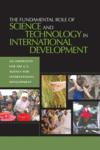 By Rustam Lalkaka, UNESCO, 2006.
By Rustam Lalkaka, UNESCO, 2006.This UNESCO Toolkit on Innovation in Engineering Science and Technology is intended to guide sponsors, researchers, educators and corporate and government planner in exploring the incubation option, and then in establishing and operating a successful Technology Business Incubation programme.
Innovation and new technologies can have an impact at all levels -- from commercializing R&D in hi-tech sectors to fining solutions such as improved water pumps and cooking stoves at the grass-roots level in developing countries. To maximize this potential, strong linkages must connect innovation, knowledge production and the diffusion of knowledge.
A Technology Business Incubator (TBI) is a facility providing nurturing services to selected start-up and entrepreneurial groups in early-stage technology-related ventures, to help them scale-up laboratory research results, or their own innovations and to develop viable businesses.
The Toolkit begins by explaining what a technology business incubator is, followed by detailed chapters on planning, implementing and operating an incubator. Using concrete examples and practical information, it outline the process of set-up; from the initial feasibility study and business plan; through choosing a location, planning the layout and finding sponsors; to selecting managers and tenants and monitoring incubator performance. It is published in the Science and Technology Development Series.
For more information contact: Tony Marjoram or UNESCO Publishing.
